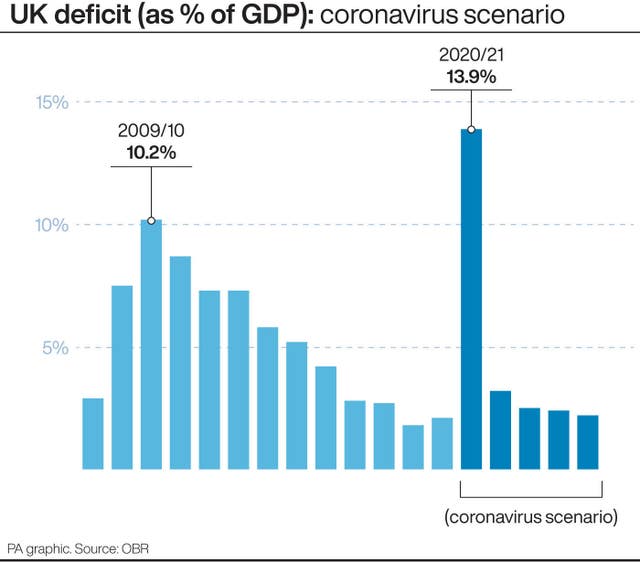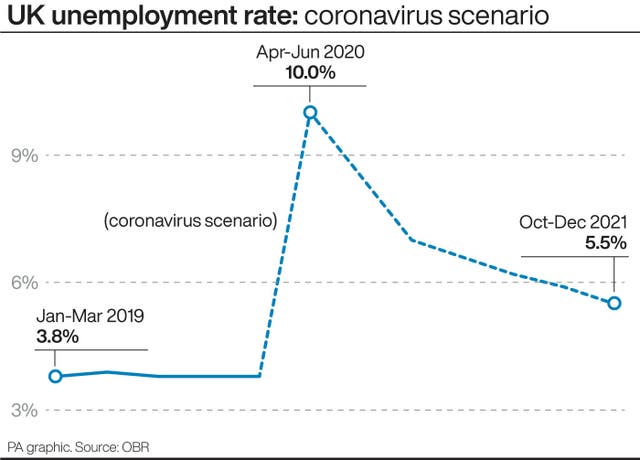
The UK economy could fall off a cliff edge due to the Covid-19 lockdown, potentially shrinking 35% between April and June while unemployment surges by more than two million, according to Britain’s fiscal watchdog.
In its first estimate of the economic toll taken by the coronavirus crisis, the Office for Budget Responsibility (OBR) said unemployment could hit 3.4 million, leaving around one in 10 of the working population without a job.
And public sector net borrowing could reach £273 billion in 2020-21, or 14% of gross domestic product (GDP), marking the biggest deficit since the Second World War.
It has based the grim outlook on a scenario where the lockdown lasts three months followed by a partial lifting for three months.

But the independent forecaster said, in this case, there will be a sharp bounce back in the economy, with gross domestic product likely to jump 25% in the third quarter and a further 20% in the final three months of 2020.
The OBR’s report, which it stressed is a scenario-based analysis and not a forecast, lays bare the scale of the challenge to Chancellor Rishi Sunak and the impact on the public purse.
Public sector net debt is expected to rise sharply, surpassing 100% of GDP at one stage during the year, but ending 2020 at 95% compared with previous estimates of 77%.
The OBR said: “The net effect of the coronavirus impact and the policy response is likely to be a sharp (but largely temporary) increase in government borrowing that will leave public sector net debt permanently higher as a share of GDP.
“However, the longer the period of economic disruption lasts, the more likely it is that the economy’s future potential output will be ‘scarred’ (thanks to business failures, cancelled investments and the unemployed becoming disconnected from the labour market).”
“If that happens, the budget deficit would reverse less of its temporary rise as economic activity recovers, leaving the Government to confront a larger structural deficit and not just higher debt.”
It said borrowing is set to balloon as the lockdown decimates tax receipts, on top of mammoth government spending to try and see the UK through the crisis.
Forecasters at the OBR were keen to stress this is a single scenario where “for now, we have not assumed the shock has lasting economic consequences” and should not be taken as a sign of what Government policy is likely to be.
Businesses are desperate for access to cash to stay afloat, with only a small fraction of the money promised making it into the bank accounts of struggling companies.
Responding to the figures in the OBR report, a Treasury spokesperson admitted the Government is working on the assumption that coronavirus will have a “very significant hit” on the economy.

Chancellor Rishi Sunak also told BBC News: “It’s clear this will have a very significant impact on our economy (in) common with economies around the world and it’s important that we’re honest about that.”
But he added: “The report makes clear that the actions we’ve taken, unprecedented actions will help to mitigate the impact of the virus on our economy.”
On unemployment, the OBR predicts that the steep rise of 2.1 million added to the 1.3 million already out of work, could happen largely in the first month of the lockdown, though it predicts it should unwind albeit at a slower pace than the GDP bounceback.
With an unemployment rate of 10% predicted in the gloomy scenario, this would be at a level not seen since the early 1990s.

Enjoy the convenience of having The Sunday Post delivered as a digital ePaper straight to your smartphone, tablet or computer.
Subscribe for only £5.49 a month and enjoy all the benefits of the printed paper as a digital replica.
Subscribe